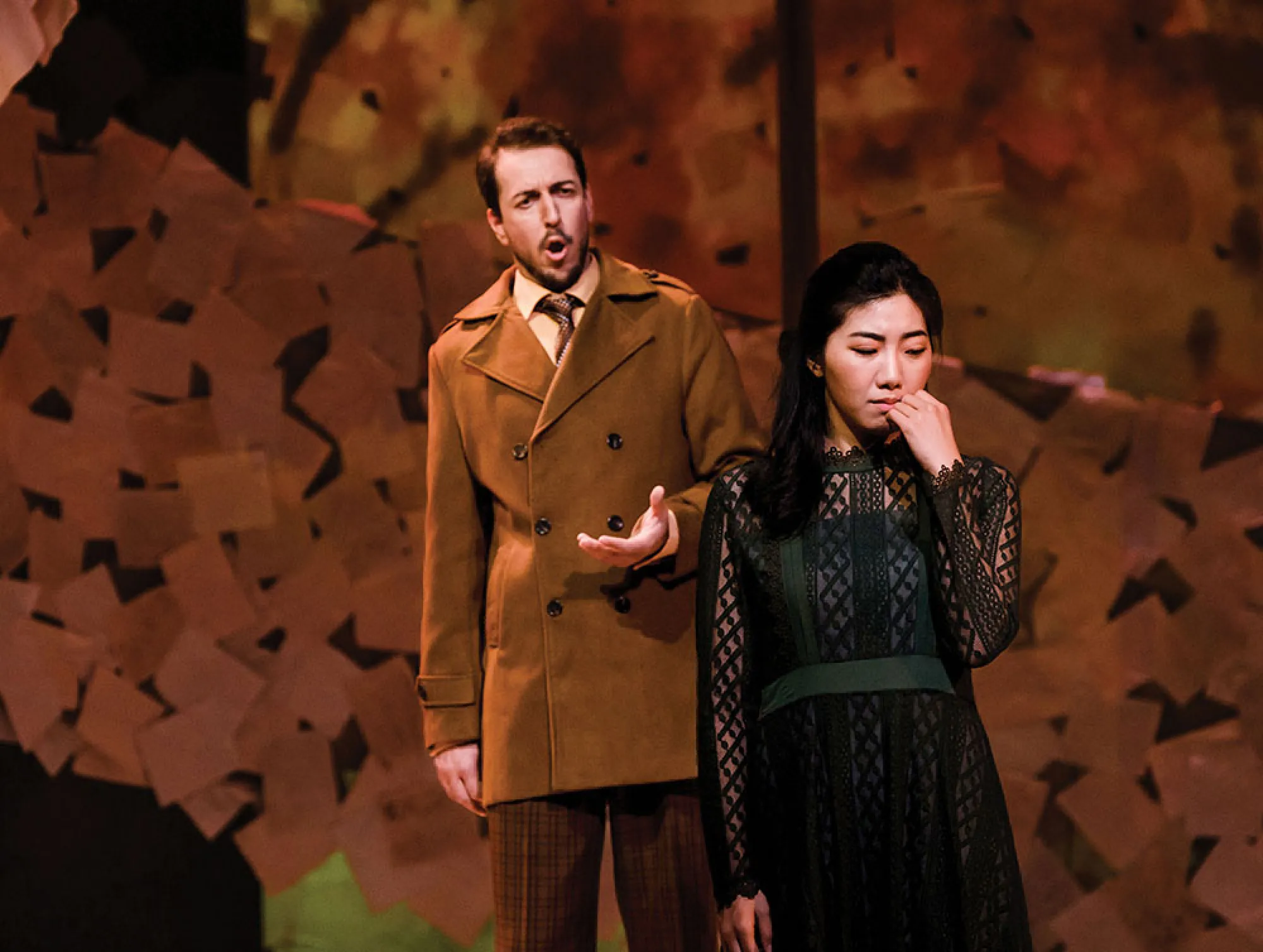August 8, 2019

Eugene Onegin at Butler, with DMA candidates Mikhail Smigelski and Zoe Chunghui Kim as Onegin and Tatiana
All Hands on Deck
Butler School of Music in Texas offers a unique cooperative experience.
By Dona D. Vaughn
Read on the Opera News website >>
On January 1, 2019, the Butler School of Music at the University of Texas at Austin announced the appointment of Dr. Tamara Sanikidze as the first woman director of the Butler Opera Center. Trained as a concert pianist in her native country of Georgia, she has a Doctor of Musical Arts from the University of Maryland and is an official pianist for Plácido Domingo’s Operalia. Sanikidze is passionate about opera and the training of opera singers. opera news met with her to discuss the performance opportunities guaranteed to singers in the Opera Performance program, and the unique approach that makes training in opera at Butler different from training at other schools and conservatories.
OPERA NEWS: You have created a lot of excitement since taking leadership of the Opera Center.
TAMARA SANIKIDZE: It’s been a whirlwind! We had Maestro James Conlon [music director of LA Opera] in residence for a master class and to help celebrate the Opera Center’s fifteenth anniversary by conducting the spring production of Eugene Onegin. We have continued our Master Class with the Artist collaboration with Austin Opera and completed the search for a new stage director with the appointment of Ecuadorian director Chia Patino to the position of stage director of the Opera Center.

Aarianna Longino (MM) and Heather Lewis (BM) as Onegin’s Larina and Filippyevna
© Nathan Russell
ON: Each year during the college application process, we hear singers getting excited about the possibility of studying opera at the Butler Opera Center.
TS: They get excited because they are guaranteed roles. We offer a Master of Music and a Doctor of Musical Arts degree in opera performance with a true emphasis on performance. We select the singers we want for both degrees, and there is no worrying about whether or not they will ever be cast in a production; if they are a part of the program, they are going to be doing a role. This year we have fourteen singers. Those who are pursuing a master’s degree in opera performance usually sing two or three roles during their time with us, while singers in the DMA program sing five roles. Sometimes there are exciting extenuating circumstances. We recently had a mezzo-soprano graduate who sang nine roles in three years.
ON: I know of no other opera program offering anything comparable to the unique cooperative program in which your opera students participate when they are not performing in their major field of study.
TS: We want our students to have a total training experience, so they know what is required to produce opera around the world. Originally designed by Dr. Robert DeSimone—recently retired as professor of music and director of opera—the program requires opera students to be involved in all aspects of a production. For example, the soprano who sang in The Telephone may not be singing in the next production; she might be working on costumes, or helping with hair and makeup. The tenor who sang the role of Tito in La Clemenza di Tito might be found working with the stage crew in the next production or running a spotlight. We use singers who are not performing onstage to fill production positions we might need.

Liu working lights for Eugene Onegin
ON: Is this also a requirement for student stage directors and coaches?
TS: Indeed it is. This year we have four directors and five coaches. Our stage directors not only are kept busy studying Italian, French and German; they direct operas that are entirely their own. They are fully in charge of staging, set design, costumes and lights. What better experience for an aspiring director than to have been an assistant stage manager or worked backstage as a stagehand? The same is true of our student opera coaches. Coming from a background of playing piano and coaching, I fully understand how demanding and difficult it is to be a successful opera coach. Coaches study Italian, French and German. They must be able to write and converse in Italian, French, German and English. This requirement is nonnegotiable. As a result, in any given production our student coaches can be found prompting singers or running supertitles. Perhaps they will work with front-of-house management or be an usher. I want our Opera Performance students to know the nuts and bolts of what it takes to run an opera house and produce an opera.

Longino and Lewis in makeup
© Nathan Russell
ON: Any complaints about having to do these jobs?
TS: We do not foster a competitive environment, so there are no stars. Because we keep our enrollment small and offer so many opportunities for working in their declared fields of study, students have not complained about having to do other duties or about a lack of opportunities.
ON: What are your students looking forward to in the upcoming school year?
TS: We have an exciting season planned, with productions of Mozart’s Don Giovanni, Jonathan Dove’s Mansfield Park, Benjamin Britten’s Turn of the Screw, and L’Elisir d’Amore. In addition to our Master Class with the Artist series with Austin Opera, we will present our own master classes with visiting guest artists. For even more excitement, there is always a mystery to be solved in discovering what the students who are not performing onstage will be doing backstage!
Dona D. Vaughn is artistic director of Opera Maine and artistic director of opera theater at Manhattan School of Music.

